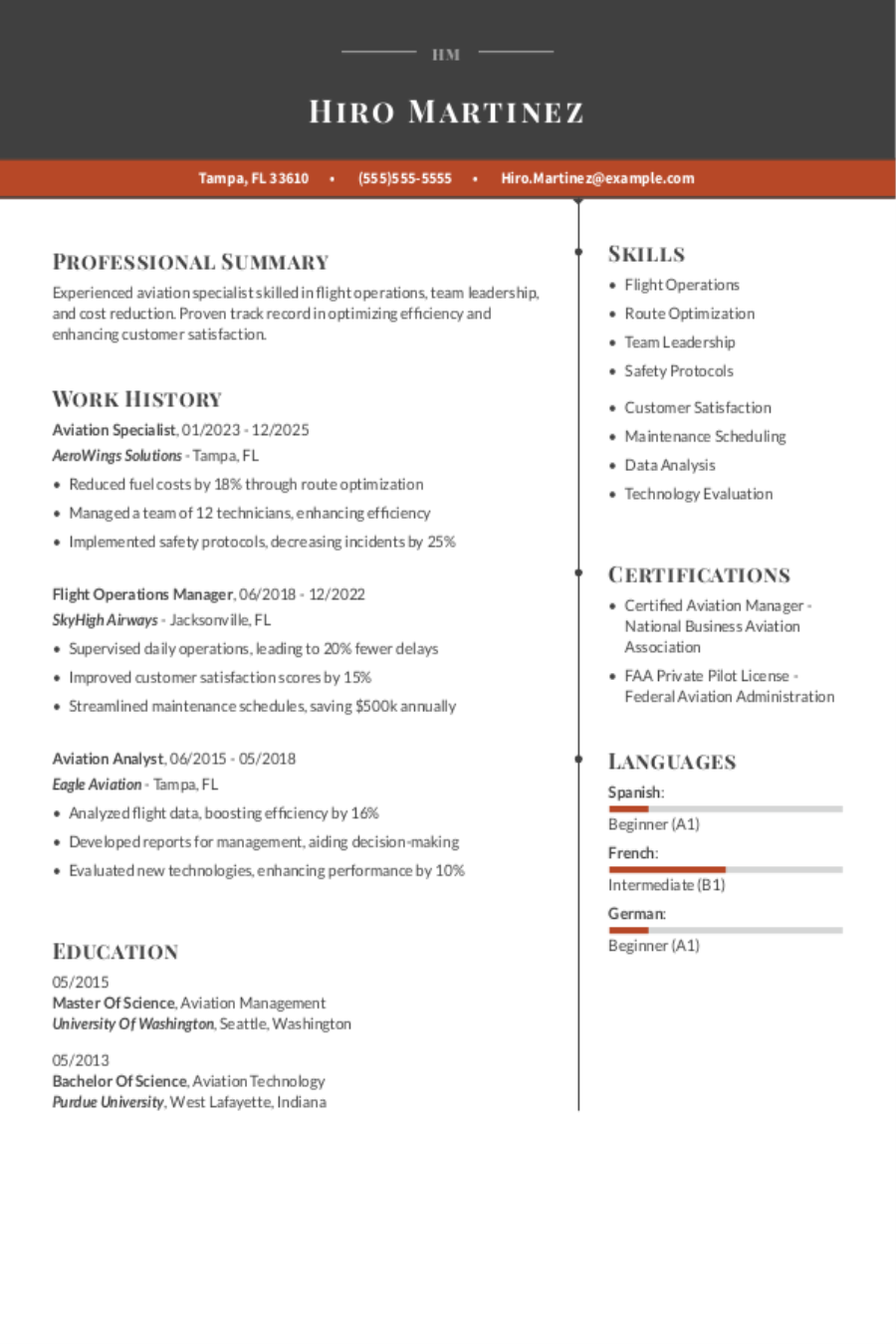Popular Dentistry Resume Examples
Entry-level dentistry resume
An entry-level resume for dentistry should focus on relevant educational background, clinical experience, certifications, and interpersonal skills to demonstrate readiness for a professional dental environment.
Emphasizes soft skills: The resume highlights the applicant's strong soft skills, such as interpersonal communication and patient care optimization, which compensate for experience gaps.
Focuses on goals: The resume illustrates a proactive approach to early career development in dentistry, highlighting successes in patient care optimization and innovative hygiene protocols that reflect a commitment to excellence and growth.
Mid-career dentistry resume
A mid-career dentistry resume should emphasize a well-rounded mix of clinical experience, specialized skills, and ongoing professional development to effectively demonstrate growth and expertise in the field.
Balances skills and experience: This job seeker's resume successfully highlights a balance of technical skills in dentistry and a clear career trajectory, showcasing advancements from general dentist to dental surgeon and ultimately to a practicing dentist.
Begins with a powerful summary: This resume's professional summary highlights essential qualifications, showcasing significant achievements like improving patient satisfaction and managing complex dental procedures. This allows recruiters and ATS to quickly recognize the applicant's expertise.
Experienced dentistry resume
An experienced dentistry resume should prioritize highlighting key achievements, relevant skills, and a clear progression in education and practice to effectively showcase the job seeker's professional journey.
Follows traditional format: The chronological resume format effectively highlights the extensive experience of the job seeker, providing a clear understanding of their career progression and significant contributions in the field of dentistry.
Optimized for ATS: The resume showcases a polished template that effectively merges a professional header with an ATS-friendly resume layout, facilitating easy navigation for recruiters and automated screening systems alike.
No experience dentistry resume
A resume for an applicant with no experience in dentistry should highlight relevant coursework, internships, and skills to showcase their passion for the field and readiness to contribute effectively.
Avoids jargon: Job seekers often feel the pressure to embellish their experience, leading them to use complex terminology for straightforward tasks. However, clear and concise descriptions are far more effective in showcasing genuine skills and contributions, making it easier for employers to assess qualifications.
Favors clarity over complexity: The resume's clean design effectively highlights qualifications through well-organized sections, showcasing relevant experience and educational achievements without unnecessary distractions.
More resume examples
Dentistry Resume Template
Looking to craft a standout application? Start with this dentistry resume template, which you can easily personalize with your own details and experience.
Aiko Johnson
Tampa, FL 33604
(555)555-5555
Aiko.Johnson@example.com
Professional Summary
A dedicated dentist with 5 years' expertise in enhancing patient satisfaction, driving health education, and performing successful procedures. Proven excellence in teamwork, treatment planning, and oral health education.
Work History
Dentistry
Northwest Dental Clinic - Tampa, FL
October 2023 - September 2025
- Improved patient satisfaction by 15% using new techniques
- Conducted 250+ successful dental procedures
- Led dental health seminars increasing awareness
Dental Hygienist
BrightSmile Dental Group - Tampa, FL
October 2021 - September 2023
- Educated 300+ patients on oral care practices
- Reduced plaque buildup by 20% in clients
- Assisted in developing personalized care plans
Dental Assistant
Smiles & Co - Miami, FL
October 2020 - September 2021
- Streamlined inventory management saving $5K annually
- Prepared rooms enabling 30% quicker turnaround
- Supported complex surgeries within compliance
Skills
- Patient Care
- Dentistry Procedures
- Oral Health Education
- Team Collaboration
- Diagnostic Proficiency
- Teeth Restoration
- Dental Radiography
- Treatment Planning
Education
Master of Science Dentistry
University of Washington Seattle, Washington
August 2020
Bachelor of Science Biology
Washington State University Pullman, Washington
August 2018
Certifications
- Certified Dental Practitioner - American Dental Association
- Advanced Oral Surgery - Dentistry Institute
Languages
- Spanish - Beginner (A1)
- French - Intermediate (B1)
- Mandarin - Beginner (A1)
Writing Your Dentistry Resume
Having explored these effective resume examples, you're now prepared to dive into the process of crafting a standout document. We'll walk you through each section step by step in our guide on how to write a resume.
List your most relevant skills
A powerful skills section on your dentistry resume should include both technical skills, such as skill in dental procedures and patient management, as well as soft skills like empathy and communication. This balance highlights your ability to excel in a clinical environment.
To improve your chances with human recruiters and applicant tracking systems (ATS), be sure to incorporate keywords from the job listing directly into your skills section. By using phrases that match what employers are seeking, you demonstrate that you fit their criteria. This strategy not only improves visibility but also conveys your suitability for the position effectively.
Example of skills on a dentistry resume
- Proficient in performing comprehensive dental examinations and diagnostics
- Adept at creating personalized treatment plans for diverse patient needs
- Compassionate communicator with a focus on patient education and comfort
- Highly organized with excellent time management skills to optimize workflow
A strong skills section is important in showing your readiness for a role in dentistry. It should include both the technical skills outlined in the job description and key soft skills, highlighting your full preparation to meet the demands of the position. This balance demonstrates your ability to thrive in a dynamic dental environment.
Highlight your work history
Your work experience section should highlight your responsibilities and showcase your achievements, demonstrating how you applied your skills in practical settings. Use specific examples that reflect your contributions and include relevant terminology that resonates with hiring managers.
When detailing each job entry, include essential information such as your title, the name of the dental practice or employer, and the dates of employment. This information gives employers a clear timeline of your experience and establishes your credibility within the field. Focus on accomplishments that illustrate your impact in each role.
Example of a dentistry work experience entry
- Dentistry
Bright Smiles Dental Clinic - San Diego, CA
June 2019 - Present - Perform comprehensive dental examinations and develop tailored treatment plans for over 300 patients annually, achieving a patient retention rate of 90%
- Administer various dental procedures including fillings, root canals, and extractions with a focus on patient comfort and safety, resulting in a 98% satisfaction score in post-visit surveys
- Educate patients on oral hygiene practices and preventive care strategies, leading to a 30% increase in patient compliance with recommended treatments
- Collaborate with dental hygienists and support staff to streamline operations and improve the overall patient experience, reducing appointment wait times by 15%
- Maintain up-to-date knowledge of advances in dental technology and procedures through continuous education, improving clinic efficiency by implementing new techniques
Highlighting outcomes and achievements in your experience section showcases your contributions effectively. Employers are more likely to be impressed by specific results and improvements you've made rather than just a list of tasks. This approach not only conveys your capability but also demonstrates your commitment to excellence in the field of dentistry, making you a more attractive job seeker.
Include your education
The education section of your dentistry resume should showcase your academic credentials in reverse-chronological order, beginning with your most recent degree. Include degrees such as Doctor of Dental Surgery or Doctor of Dental Medicine and relevant certifications, while excluding high school diplomas if you possess a higher education qualification.
For ongoing or incomplete education, list your highest completed level along with an expected graduation date. Including bullet points that highlight relevant coursework or notable academic achievements can be particularly useful for current students or recent graduates. As your career progresses, these details become less significant compared to professional experience.
Common certifications for a dentistry resume
- Doctor of Dental Surgery (DDS) – American Dental Association (ADA)
- Doctor of Medicine in Dentistry (DMD) – American Dental Association (ADA)
- Board Certified Dentist – American Board of General Dentistry
- Certified Dental Assistant (CDA) – Dental Assisting National Board (DANB)
Sum up your resume with an introduction
Your resume profile is your chance to make a memorable first impression on potential employers, showcasing your unique qualifications right at the top.
If you have significant experience in dentistry, consider using a professional summary that emphasizes your key achievements and skills relevant to the position. This approach allows you to present a concise overview of what you bring to the table, making it easy for recruiters to see why you're a strong job seeker. If you're just starting out, starting with a resume objective that reflects your career goals can provide useful context to employers.
Professional summary example
Careful dentist with over 10 years of experience in diverse clinical settings. Recognized for improving patient care through advanced treatment planning, comprehensive oral examinations, and a commitment to preventive dentistry. Proficient in the latest dental technologies and techniques, dedicated to fostering a welcoming environment that prioritizes patient comfort and satisfaction.
Resume objective example
Enthusiastic dental assistant eager to use strong interpersonal skills and attention to detail in a supportive role within a progressive dental practice. Committed to improving patient experiences and ensuring efficient clinic operations through effective communication and organizational abilities.
In the field of dentistry, your resume profile is important for making a strong first impression. Use this section to highlight key skills and qualifications directly from the job description. This strategic approach not only showcases your fit for the role but also improves your chances of passing through applicant tracking systems (ATS) that many employers use.
Add unique sections to set you apart
Optional resume sections can help you highlight your unique qualifications for dentistry positions. By including these sections, you offer employers a glimpse into what sets you apart from other job seekers.
These additional details allow you to showcase relevant hobbies and volunteer work that reflect your personal values and skills. For example, if you volunteer at a dental clinic or participate in community health initiatives, it demonstrates your commitment to patient care beyond the office. Such experiences enrich your application and provide insight into your work ethic and passion for the field of dentistry.
Three sections perfect for a dentistry resume
- Languages: In dentistry, effective communication with patients is essential. If you speak multiple languages, make sure to highlight your language skills on your resume. It improves patient trust and improves their understanding of treatment options.
- Volunteer Work: Including volunteer work on a resume not only improves your professional skills but also showcases your dedication to making a positive impact in the community. This addition reflects your values and commitment to helping others.
- Accomplishments: In dentistry, quantifiable accomplishments are vital for demonstrating the effectiveness of your care. You can showcase metrics like increasing patient retention by 25% by weaving them into your work history section or by creating a unique section to house them.
5 Resume Formatting Tips
- Choose a format that matches your career stage.
Selecting the appropriate resume format hinges on your career level. If you have significant experience, a chronological format highlights your work history effectively. For those just starting out or changing careers, consider a functional style that emphasizes skills over job titles. A combination layout may also serve as an excellent middle ground to showcase both experiences and abilities.
- Pick a smart resume template.
To improve the clarity of your resume, consider using a professional resume template. This approach promotes easy readability and organizes your information effectively. If you opt for a custom format, ensure it remains straightforward and uses fonts that are compatible with applicant tracking systems.
- Select an appropriate font.
Select a clear and professional font for your resume to improve readability. Choosing well-known fonts like Helvetica, Georgia, or Verdana helps ensure ATS compatibility while appealing to hiring managers.
- Use consistent formatting.
Ensure your resume features a clean, left-aligned format with uniform margins. This creates a polished look that reflects your professionalism in the field of dentistry.
- Keep your resume to one or two pages.
When crafting your resume, keep in mind that resumes should be one page long unless you have extensive experience. Focus on concise, relevant details that highlight your skills and achievements to keep hiring managers engaged.
Tools for Your Job Search
Ready to advance your dentistry career? Before you submit your application for that coveted dental position, consider using our ATS Resume Checker. This tool provides essential insights into how your resume will fare with the automated systems many dental practices use to screen potential job seekers initially.
Seeking comprehensive resume support? Our AI Resume Builder offers intelligent content recommendations tailored specifically to your dental background, along with professionally designed templates that ensure your clinical expertise and qualifications stand out to hiring managers.
Frequently Asked Questions
Last Updated: October 1, 2025
Absolutely. A cover letter is important because it adds depth to your resume and provides a unique opportunity for you to engage with potential employers. It allows you to convey your enthusiasm for the role and highlight relevant experiences that make you an ideal job seeker. Don’t miss this chance—write a cover letter that improves your application!
For a quick and effective solution, consider using our AI Cover Letter Generator. It helps you create customized, job-winning cover letters in just minutes. Plus, you can choose from various cover letter template options that perfectly align with your resume, making your application stand out even more.
A CV (curriculum vitae) is generally more extensive than a resume. While resumes are concise, spanning one to two pages, CVs can extend several pages and include detailed information about your academic qualifications, research experiences, publications, and professional history.
You should use a CV when applying for positions in academia or specialized fields like dentistry. If you're unsure about how to craft your CV, our online CV Maker is here to assist. With various CV templates designed for different career levels and industries, you can create a tailored CV quickly and efficiently—just choose the one that fits your needs and get started!
When faced with gaps on your resume, be honest about the reasons behind them. Explain what happened, but keep it brief. Focus on productive activities you engaged in during that time, such as furthering your education or volunteering. This shows potential employers that you remained committed to personal growth. After addressing the gap, shift the conversation back to your qualifications and relevant experience to emphasize your readiness for the position.
Absolutely, skills like "patient care" and "diagnostic imaging" are important on dentistry resumes. It's also beneficial to review job descriptions for additional key phrases that employers prioritize in this field.
To improve your networking skills in dentistry, regularly reach out to former classmates and colleagues to maintain those connections. Consider joining dental associations or local study groups. Also, keep your LinkedIn profile current to showcase your expertise and engage with industry updates.
Many dental professionals begin as dental assistants or hygienists, gaining experience in patient care. With further education and training, they can advance to roles such as dentists or specialists in various fields of dentistry.
Was this information helpful? Let us know!
Leisha is a career industry editor dedicated to helping job seekers excel in their careers.
More resources

How to Make a Canadian Resume (Format, Template + Examples)
Creating a Canadian resume is key to getting a job in Canada. ...

How to Write a Resume for an Internal Position (Guide + Examples)
Ready for a new role within the same company? We ll help you...

The Great Workplace Reckoning: How 2025 Burned Out Workers & What’s Next for 2026
The workforce spent much of 2025 in survival mode navigating ...

Compliance Resume: Examples & Templates
As a compliance professional you need a resume that showcases...

Top Architecture Resume Examples & Pro Writing Tips
As an architect your resume must highlight essential skills l...

Aviation Resume: Examples & Templates
As an aviation professional you need a resume that showcases ...

